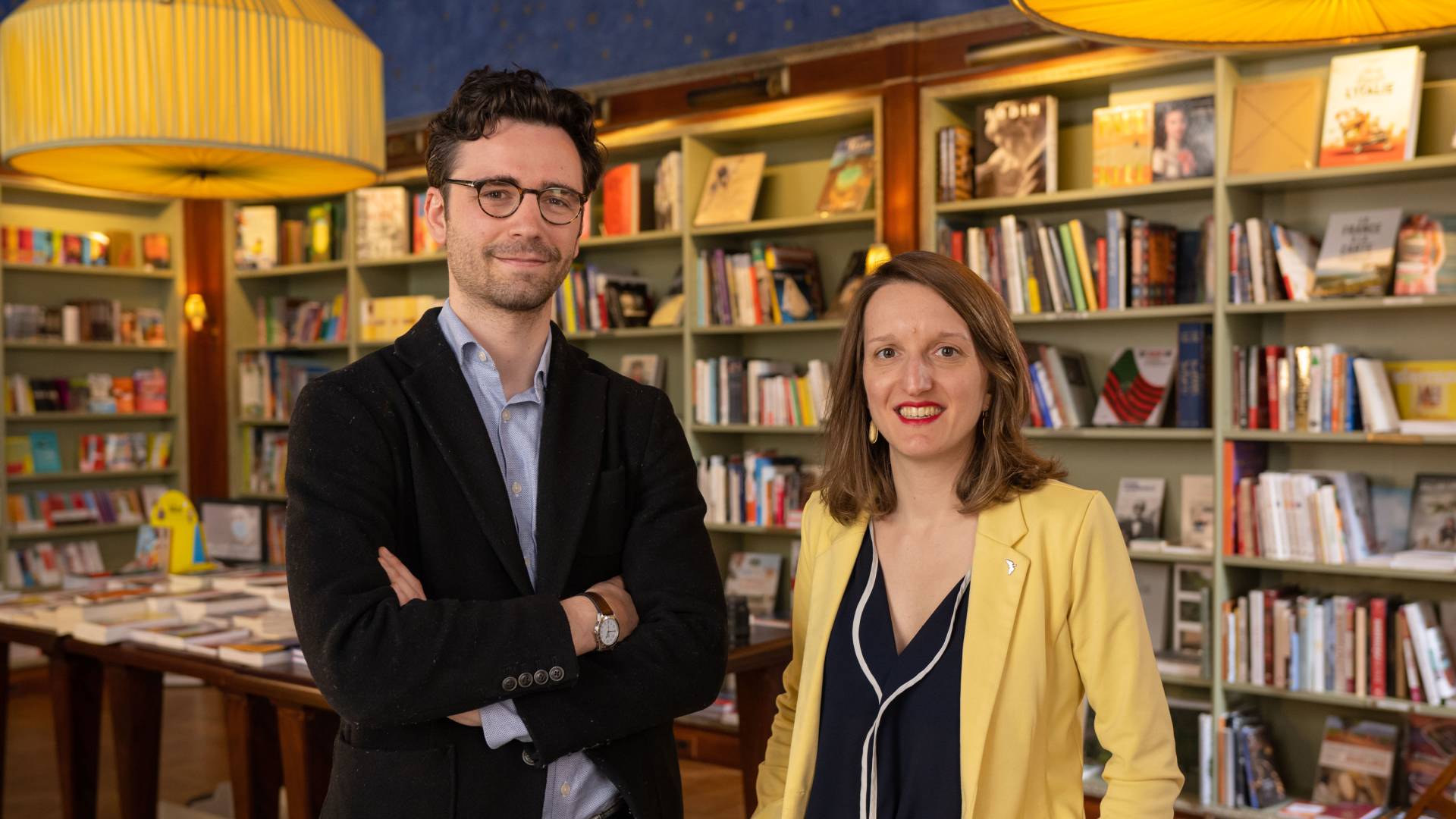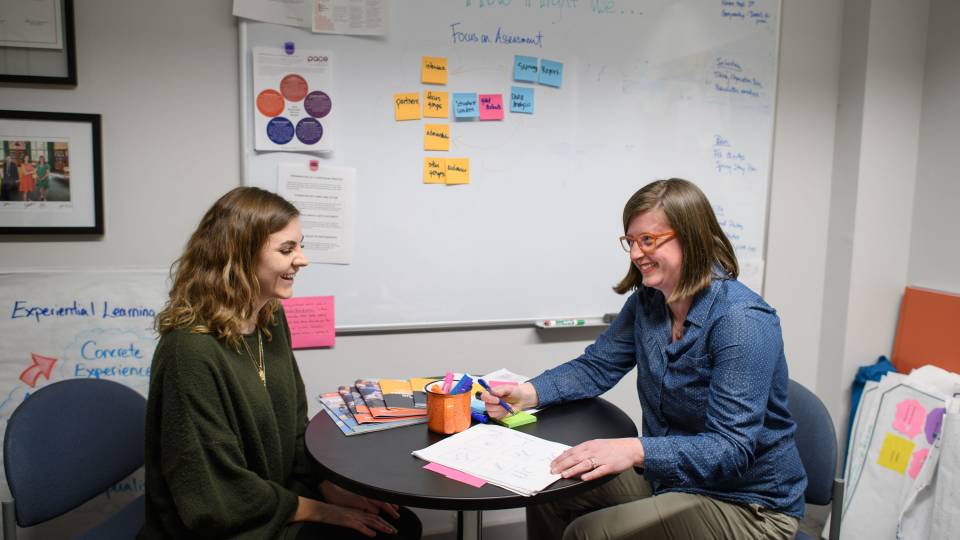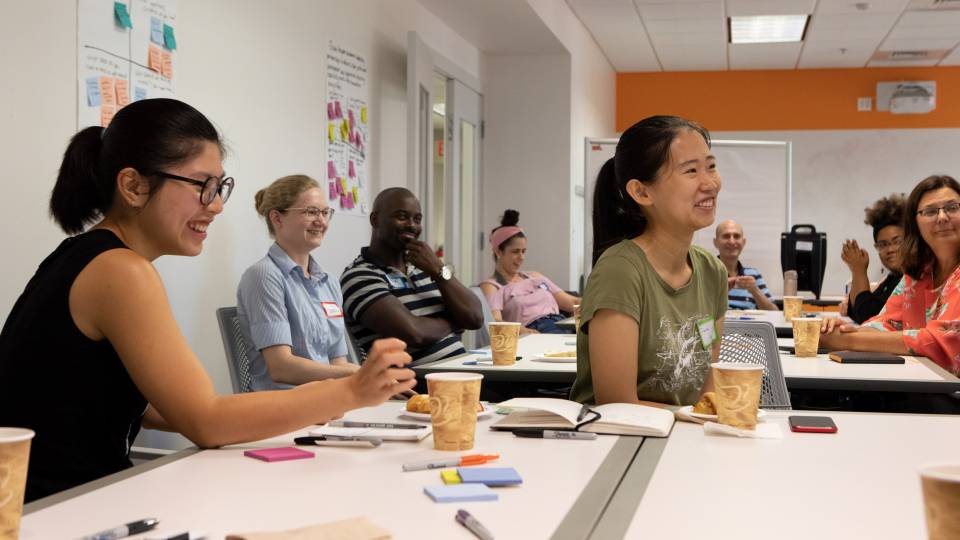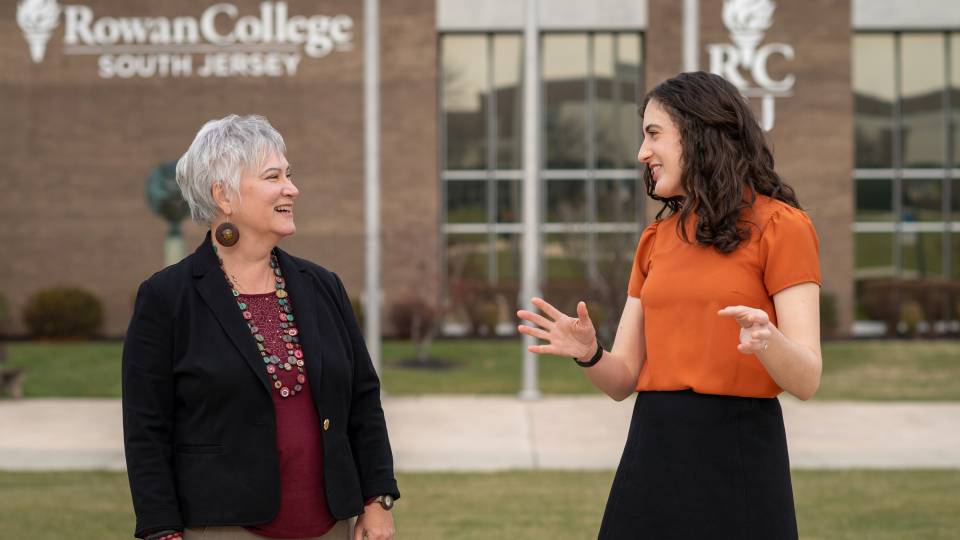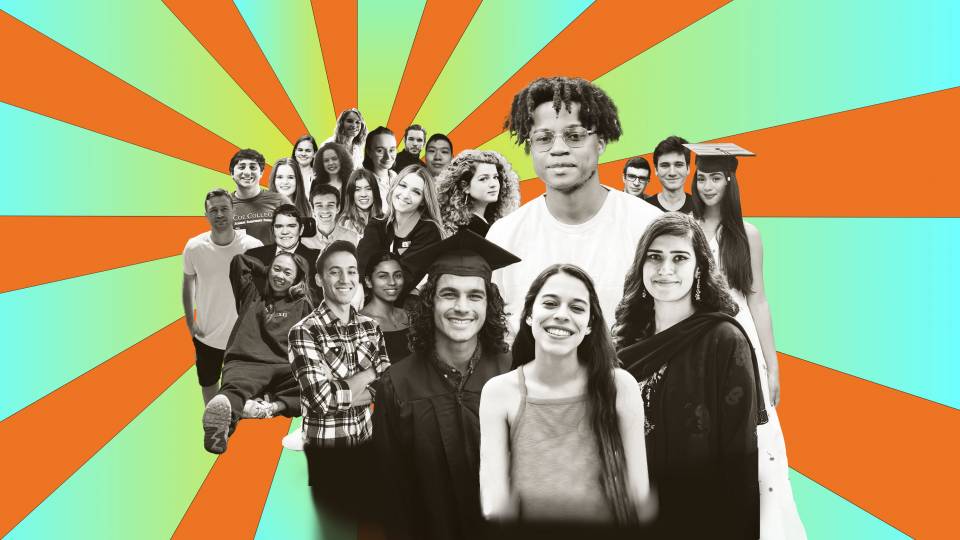Pierre Azou (left), a Ph.D. student in the Department of French and Italian, completed a Social Impact Fellowship at the French Cultural Services of the French Embassy in New York with the guidance of his mentor, Emma Buttin (right), general coordinator of the residencies at Villa Albertine, a cultural institution that offers tailor-made residencies for global creators, thinkers and cultural professionals.
Pallavi Podapati decided to pursue a Ph.D. in history of science with the idea that having a deep reserve of historical knowledge could make her a better policy advocate. She has since found that the reverse is also true: that working in the policy world has helped her to refine and apply her academic training.
Through Princeton’s GradFUTURES Social Impact Fellowship Program, Podapati interned with the American Society on Aging. At first, she tracked social issues affecting older adults during the pandemic, including food insecurity. Later, she examined how to make technology accessible to older adults, particularly those with lower incomes.
“I started grad school with the idea that it would help to have a deep knowledge of the social conditions that created the issues that I’m interested in like labor, public health, disability and aging,” Podapati said. “Now, as a Ph.D. student, I have the research capacity to understand a very complex social issue quickly, and in a nuanced way. But how do we then engage with policymakers, people running nonprofits, people operating foundations?”
Helping graduate students to build these types of highly marketable, transferrable and concrete job skills is a central aim of the Social Impact Fellowship. At the same time students are learning to apply their academic training to high-level projects and build professional competencies, they also are contributing to the social impact mission of their host organization.
Meaningful professional development with strong mentorship
With the approval of their faculty adviser, graduate students participate in the program during the academic year for 10 hours per week or during the summer for up to 40 hours per week. Fellows receive a stipend funded by the Graduate School.
“We custom designed these opportunities to allow graduate students the flexibility they need to pursue their academic research while engaging in meaningful professional development and exploration,” said Eva Kubu, associate dean for professional development and director of GradFUTURES. “When it comes to professional development, there is simply no substitute for immersive experiences and great mentorship.”
Mentorship is a key component of each of the experiential fellowship programs offered by the Graduate School, including the University Administrative Fellowship and Community College Teaching Fellowship, in which graduate students can partake in real-world professional development opportunities.
“Forging relationships with mentors in addition to their faculty advisers helps graduate students build a supportive professional network and gain social capital,” Kubu said. “This is particularly important for first generation, low-income and underrepresented graduate students.”
Since the program’s inception in 2021, 16 students have completed Social Impact Fellowships. This semester, Princeton has 16 Social Impact Fellows — more than double the number of fellowships from last spring. The GradFUTURES Two-Year Impact Report includes additional information about the range of experiential programs and partners.
Host organizations work closely with the Graduate School to determine the learning outcomes and professional development goals for these immersive experiences. Together, the graduate student and their mentor develop a plan that focuses on the individual needs and unique interests of the student.
Expertise and ingenuity in service to global challenges
The expectation is that the fellowship will be mutually beneficial, and host organizations will benefit from the diverse ideas and expertise of graduate students as they complete projects to address local, regional, national and global challenges.
“Aligned with the University’s mission of service to humanity, the program is proving the ability of Ph.D.s across all disciplines to contribute their research and analytical skills in ways that can help a nonprofit or public sector organization advance its mission, develop solutions and achieve greater impact,” Kubu said.
Some students choose a fellowship that aligns closely with their research, but they also can use the opportunity to develop a parallel strength or new talent.
Pierre Azou, a Ph.D. student in the Department of French and Italian, completed his Social Impact Fellowship at the French Cultural Services of the French Embassy in New York, a division that promotes French arts, literature, cinema, language and higher education across the United States. Cultural Services also builds partnerships between French and American artists, institutions and universities on both sides of the Atlantic.
Azou said his career goal is to work somewhere where he can bridge the academic and French cultural worlds — an art institution, for instance. His Social Impact Fellowship allowed him to experience the day-to-day operations of the French Cultural Services and to contribute to program development.
Azou worked on vital aspects of Villa Albertine, a cultural institution offering a residency program for global creators, thinkers and cultural professionals. Working closely with his mentor, Emma Buttin, general coordinator of the residencies at Villa Albertine, Azou tested and helped run the platform to select and onboard fellows, liaising with the embassy's network across the U.S. He also curated data to measure the impact of the program and researched themes for a special residency program that would operate alongside the main residency program.
While at the embassy, Azou met with the head of the books and ideas department about the Prix Goncourt, France’s most prestigious literary prize. This year for the first time, Ph.D. students from six American universities will award their own Prix Goncourt, choosing from the same shortlist as the actual Prix Goncourt. Azou also contributed ideas on how to increase the visibility of the prize in the U.S., including at Princeton.
A practical sense of how things get done
“I love the fact that it’s such a small team,” he said. “They have several departments: books and ideas, cinema, visual arts and performing arts. And because it’s such a small team — only one or two people for each department — you definitely can get a sense for what everybody is doing, and talk to all these people, and ask them how they do things. You get this sense of how things are done on a very practical level.”
Podapati had an equally rich experience at the American Society on Aging, where she was able to make significant contributions as a fellow.
“We were really able to use Pallavi’s skills to our advantage,” said Leanne Clark-Shirley, the organization’s vice president of programs and thought leadership. “She did some deep-dive research into issues that we have wanted to talk about, like building pathways for providers of color in medicine and aging. And we worked together to translate her academic-minded reports into different styles for different uses by non-academic entities.”
Translation and exchange are central tenets of the Social Impact Fellowship Program, said assistant dean for professional development James M. Van Wyck.
“Experiential opportunities enable Ph.D.s to learn best practices for sharing their research with a range of audiences — and to incorporate what they are learning from these new audiences into their research," he said. "The Social Impact Fellowship Program prepares graduate students to try out new modes for pursuing the life of the mind and helps them see what a publicly-engaged Ph.D. can do — regardless of whether they take up a faculty role or move into positions beyond the academy.”
As a former Ph.D. student herself, Clark-Shirley understood some the challenges of translating doctoral-level research, writing and presentation for a variety of audiences. Making that transition is vital as Ph.D.’s apply their skills in different types of career settings.
“A lot of my colleagues are leaving academia for better or for worse, and they’re struggling because not every program helps you think about what it’s like to work in a non-academic setting and what it’s like to reframe the skills that you bring and apply them to a non-academic setting,” Clark-Shirley said. “So, I think especially Princeton Ph.D. students who go through the program will be way more marketable in the academic or non-academic environment.”
Kubu added, “Participating in this sort of fellowship can differentiate Princeton graduate students and create optionality in an ever-evolving job market, but our hope is that this experience also inspires them to apply their doctoral training in myriad ways that serve the public good.”
